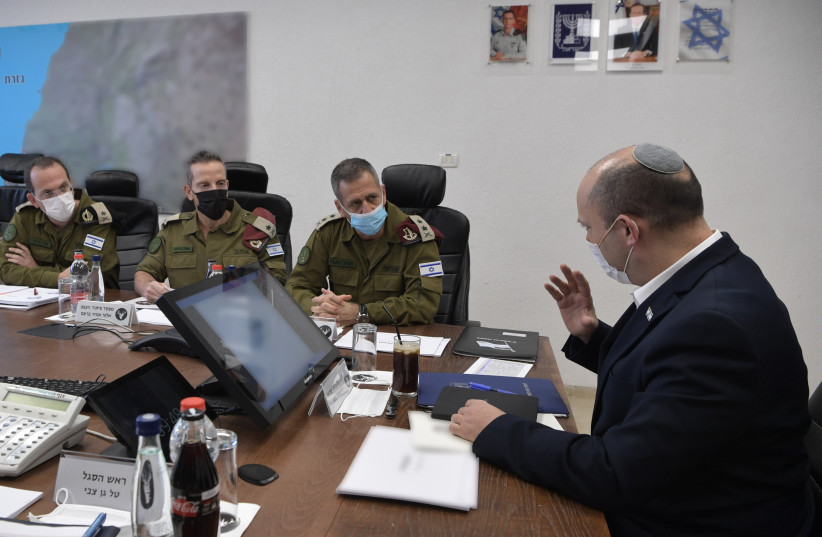Last week, IDF Chief of Staff Lt.-Gen. Aviv Kohavi valiantly fought for his soldiers and won. He came to the cabinet meeting in Jerusalem and demanded that the ministers approve a NIS 1 billion bump in the defense budget so he could hand out extra pensions to career officers who he believes deserve it.
“This decision is about how the state treats the army, how the state treats the people who defend it, people who could develop careers outside and decide to stay, contribute to the state in the military, with much lower salaries than they could do outside,” Kohavi told the ministers.
He received the backing of Defense Minister Benny Gantz and Prime Minister Naftali Bennett. Despite seven ministers who voted against the pension funds, the new allocation passed with a majority.
Kohavi should be commended for fighting on behalf of the men and women who serve in the IDF. But why did he not say a word about the regular soldiers, the young 18-year-old conscripts who enlist in the IDF and give two to three years of their lives to the state and its military.
It was nice to see the chief of staff stand up for the career officers, but his silence when it came to the tens of thousands of regular soldiers who serve in the IDF was deafening.
Why, for example, do soldiers still make a fraction of Israel's minimum wage? Why do non-combat soldiers get paid only about NIS 1,000 every month? Why do combat soldiers – without a doubt the troops whose lives are most at risk – get paid only NIS 2,000? And why was Kohavi’s voice not heard about this?
Instead, all we hear about is an IDF effort to increase soldiers’ salaries by a few hundred shekels a month, a move that would require an additional NIS 150-200 million a year. That is just a quarter of the billion shekels that he succeeded in securing to increase the already impressive pensions that career officers will receive from their mid-forties.
This isn’t to say that the career officers do not deserve an increased pension but there is a question of what the national priority should be. There is no doubt that the army – as well as the Shin Bet (Israel Security Agency) and the Mossad – face a tremendous challenge in retaining high-quality workers when these same people can earn three-to-four times the amount they make in the defense establishment in the tech sector. Offering an improved pension can help keep them longer in uniform.

But we also need to take care of the regular soldier, the young 18-year-old who is asked to do what no other western country asks of its youth – to give up nearly three years of his life alongside his freedom in order to serve in the IDF.
The expectation that these youth should just enlist in the army because that is the law or because that is what their parents did is no longer enough. We need to recognize reality – Zionism and ideology are just not enough anymore.
With 50 percent not serving at all, Israel needs to make sure that it compensates those who do serve and there are two easy ways to do that.
The first is to pay all soldiers a monthly minimum wage, just over NIS 5,000. Considering the number of hours they put into their service, that is the least we can do. The country can then create a pay scale to compensate even more the soldiers who serve in combat units, who rarely go home and sleep very little at night.
And then there is the matter of higher education. Every soldier deserves a free university degree on behalf of the service they provided the state. Currently, combat soldiers get help with just some of the tuition and non-combat soldiers get almost nothing. This is ridiculous.
So, while it was nice to see Kohavi fight for career officers, he left tens of thousands of his soldiers behind, forgetting the regular conscripts and their needs.
And let’s not forget Bennett. In 2012, when he first entered politics, Bennett promised to secure more benefits for Israel’s soldiers. He is now prime minister. It is a good opportunity to finally make good on a decade-old promise.
